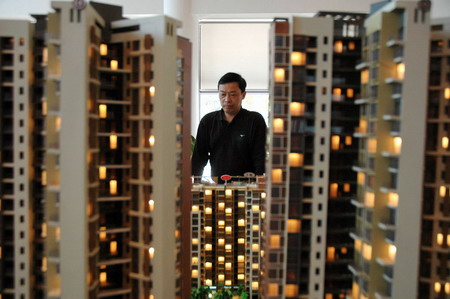Realty Tiger to Be Tamed
Adjust font size:
 |
|
A customer checking out a model of a real estate project in Shenzhen, Guangdong Province. Property prices in China's 70 major cities rose at the fastest pace in 16 months in November. [China Daily] |
China's central bank on Wednesday said it will manage inflation expectations and keep a close watch on the property market through its credit and money supply policies.
In a statement on its website, the People's Bank of China (PBOC) said it would try to maintain ample liquidity in the financial system, and ask banks to lend more evenly, while strictly implementing credit policies in the property sector.
The nation will also take steps to rein in fast-rising property prices and strengthen credit controls for the sector, according to Housing and Urban-Rural Development Minister Jiang Weixin.
"We should scrap or adjust local property policies launched last year that no longer comply with the current macroeconomic goals," Jiang said.
According to Dong Chen, director of the research institute of Southwest Securities, the government moves on real estate policies indicate that while policymakers are striving to cement the economic rebound, they are also serious in curbing the excessive liquidity in the financial system to allay fears of asset bubbles and inflation.
Property prices in China's 70 major cities rose at the fastest pace in 16 months in November, fueling concern that record lending and inflows of capital from abroad are building up asset bubbles.
"Credit policy is the key to curb the rising property prices, as it would have a direct impact on transaction volumes," said Su Xuejing, an analyst with Changjiang Securities.
"We anticipate more policy tightening in the future like increasing the down payment and mortgage rates for second-home buyers," he said.
Shanghai Securities News said on Tuesday that the government plans to expand trials of a real estate tax, citing an unidentified person close to the State Administration of Taxation.
The anticipated policy changes have also affected the capital market performance of leading realtors. Shares of China Vanke Co, the country's largest listed property developer, have fallen more than 12 percent in the past month on concerns that the measures to cool the property market would impact earnings. Poly Real Estate Group Co, the second largest real estate firm, also saw its shares fall to a four-month low.
Meanwhile, a report from UK real estate service provider Savills said that the tighter credit policies and soaring realty prices have spurred property sales by international investors. Many of the investors had acquired the properties several years back and have been able to get handsome returns now, it said.
"Sales by foreign investors increased from 7 percent in 2008 to 20 percent in 2009," said the report.
(China Daily January 7, 2010)
